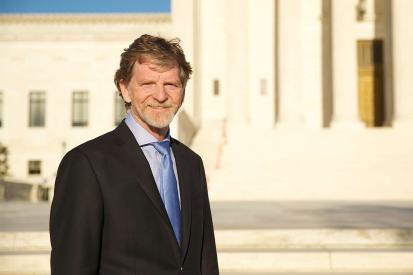Supreme Court Upholds Jack Phillips’s Freedom 7-2


Can the government force a Democrat speechwriter to write speeches for a Republican president? Should a Muslim painter be forced to create a painting depicting Muhammed? Can a state law force an LGBT graphic artist to create a website that condemns same-sex marriage?
Most Americans would say that the government should not have such power.
Why? Because they understand that a person’s First Amendment rights to free speech and religious freedom protect them from being forced to speak messages they disagree with.
This is especially true for artists and others in creative professions such as Jack Phillips.
Jack and his wife co-own Masterpiece Cakeshop in Colorado. There, Jack uses his artistic talents to create custom cakes for weddings, birthdays, anniversaries, and many other events. He also sells pre-made items like cookies and brownies. There’s something for everyone to enjoy.
Jack gladly creates cakes for people from all backgrounds, but like many other cake artists, he declines custom cake requests promoting messages that conflict with his beliefs, including cakes celebrating Halloween and adult-themed events, those that express an anti-American message, and cakes for same-sex weddings. He has also declined to create a cake disparaging people who identify as LGBT.
Yet when a same-sex couple came into Masterpiece Cakeshop to request a cake celebrating their wedding and Jack politely declined, a Colorado government agency said that Jack had discriminated based on sexual orientation—even though it was the message, not the people, that Jack had objected to. It took a Supreme Court ruling to prove that it was actually the government that was discriminating by targeting Jack for his faith.
Let’s explore the specifics of this case.

Who is Jack Phillips?
Jack Phillips, a Colorado native and cake artist, opened Masterpiece Cakeshop in 1993 and has served the community of Lakewood, Colorado, for nearly 30 years.
In his years of business, Jack has been a part of major milestone events for many in the community. He’s watched families grow from young couples requesting wedding cakes to parents ordering graduation cakes for their children.
Masterpiece Cakeshop is also a family business. Jack's wife is a co-owner of the shop. His daughter helps decorate cakes, and a sister volunteers to keep the shop clean.
As a Christian, Jack knows that God can use even small shops like his to do God's work. Because of this, Jack’s faith motivates and informs how he operates his business.
But he would one day find out that the State of Colorado would order him to strip his faith from his business.
Masterpiece Cakeshop v. Colorado Civil Rights Commission
In July 2012, two men came into Jack’s cakeshop requesting a custom wedding cake celebrating a same-sex wedding. In a brief exchange, Jack politely declined the request, saying he could not create custom cakes celebrating same-sex weddings, but he offered to design them custom cakes for other occasions or to sell them anything else in his shop.
Shortly after that, Jack started to receive phone calls from people threatening and harassing him because of his decision to not design a cake celebrating a view of marriage that conflicts with his faith. Instead of responding in anger, Jack saw the calls as an invitation to pray for those he didn’t know.
But the two men soon filed a complaint with the Colorado Civil Rights Commission for sexual orientation discrimination. That’s when Alliance Defending Freedom came to Jack’s defense.
Even after explaining to the Commission that it wasn’t the people Jack objected to, but rather the message the cake would send about marriage, an administrative law judge ruled against Jack. The judge said designing custom cakes cannot constitute speech protected by the First Amendment.
The Commission ordered Jack to either violate his faith by designing custom cakes that celebrate same-sex weddings or stop designing all wedding cakes, which was a big part of his business. In addition, Jack was ordered to “reeducate” his staff by teaching them that he was wrong to operate his business consistently with his faith. The state also required Jack to file quarterly “compliance” reports telling the government every time that he declines a custom cake request and explaining the reasons why.
Ironically, the same Colorado Civil Rights Commission that ruled against Jack found that three other Denver cake artists were not guilty of discrimination when they declined a religious customer’s request for a cake that reflected his opposition to same-sex marriage.
In July 2016, ADF attorneys petitioned the U.S. Supreme Court to take up Jack’s case. Thankfully, after the Supreme Court granted review, it ruled 7 to 2 in favor of Jack on June 4, 2018. The ruling reversed the state’s decision to punish Jack for living and working consistently with his religious beliefs about marriage.
Case timeline
- July 2012: Two men came into Masterpiece Cakeshop to request a custom cake to celebrate a same-sex wedding. Jack Phillips politely declined, explaining that while he would create other cakes for them or sell them anything in his shop, he could not design cakes for same-sex weddings. It was about the cake’s message, not the people asking for it.
- September 2012: A complaint was filed with the Colorado Civil Rights Division accusing Jack of discriminating on the basis of sexual orientation.
- December 2013: An administrative judge ruled against Jack. ADF appealed the ruling, but in May 2014, the Colorado Civil Rights Commission’s order was finalized.
- July 2014: ADF appealed the Commission’s ruling to the Colorado Court of Appeals.
- August 2015: The Colorado Court of Appeals ruled against Jack. That October, ADF appealed to the Colorado Supreme Court.
- April 2016: The Colorado Supreme Court declined to take Jack’s case.
- July 2016: ADF petitioned the U.S. Supreme Court to take up the Masterpiece case.
- June 2017: The Supreme Court agreed to hear Jack’s case.
- December 2017: ADF General Counsel Kristen Waggoner represented Jack during oral arguments at the Supreme Court.
- June 2018: The Supreme Court ruled 7-2 in Jack’s favor.
Outcome
After nearly six years of legal battles for Jack, the Supreme Court ruled in his favor in Masterpiece Cakeshop v. Colorado Civil Rights Commission. The ruling reversed the state’s decision to punish Jack for living and working consistent with his religious beliefs about marriage.
On behalf of the majority, Justice Anthony Kennedy wrote that “the record here demonstrates that the Commission’s consideration of Phillips’ case was neither tolerant nor respectful of his religious beliefs.”
“Jack serves all customers; he simply declines to express messages or celebrate events that violate his deeply held beliefs,” Waggoner said. “Creative professionals who serve all people should be free to create art consistent with their convictions without the threat of government punishment.”
“Government hostility toward people of faith has no place in our society, yet the state of Colorado was openly antagonistic toward Jack’s religious beliefs about marriage,” Waggoner added. “The court was right to condemn that. Tolerance and respect for good-faith differences of opinion are essential in a society like ours. This decision makes clear that the government must respect Jack’s beliefs about marriage.”
Unfortunately, this wouldn’t be the last time that Colorado would bring Jack into court. Because the Supreme Court declined to rule on the merits of the Colorado law itself, Jack has been back in court not once but twice now.
But in December 2022, the Supreme Court heard another ADF case, 303 Creative v. Elenis, involving a different artist in Colorado. Lorie Smith, a graphic designer who owns a studio called 303 Creative, was being threatened by the same state law used to target Jack.
In a 6-3 decision, the High Court ruled that Colorado could not misuse its public accommodation law to force Lorie to express messages she disagrees with. The decision affirms the First Amendment right of all Americans to choose what messages to express, and ADF attorneys have asked the Colorado Supreme Court to apply this ruling to protect Jack in his latest legal battle.
The bottom line
True tolerance is a two-way street, not a zero-sum game where the government can crush a person of faith simply for living and working consistent with their deeply held convictions and beliefs. Everyone’s freedom is at risk when the government is able to punish citizens like Jack just because the government doesn’t like how he exercises his artistic freedom.
Creative professionals like Jack should be free to create expression consistent with their faith and conscience without fear of government punishment.
Learn more:
Hear Jack, his daughter, and others talk about his story:
Take a look inside Masterpiece Cakeshop on the day the Supreme Court ruled in favor of Jack:
